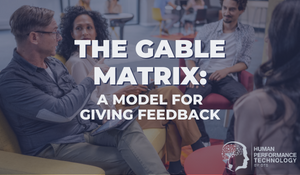Tim Ferriss & A Furious Monkey Reveal the Most Important Lesson on Emotional Intelligence
“We don’t respond to what happens; we respond to our perception of what happens… it’s with our minds we create the world.” — Gabor Maté. I’m always on the lookout for materials and resources to share with facilitators, trainers, coaches, consultants, and learning professionals (that is to say, our newsletter readers)...
Which could be anything from a useful leadership framework, to the latest people management trends, to an interesting video to prompt a group discussion on, let’s say, teamwork and emotional intelligence. Today’s subject is the latter kind — two videos, actually, not just one — which converge on an issue at the heart of nearly every form of conflict, pain, stress, negative feeling, and difficult human relationship.
Video #1, explained by eminent primatologist Frans de Waal, deals with a famous inequality experiment. To quickly summarise, the monkey on the left is given cucumber as a reward for returning a rock, which is fine for this breed of monkey — so long as everyone else is getting the same reward. But when the partner monkey on the right is given grapes (a superior treat) for the same work, the reaction of the quarry worker now aware she’s on the inferior cucumber payroll is utterly priceless. This suddenly uncooperative, floor-slapping, cage-shaking animal is probably my all-time favourite visual metaphor for our primitive lower-brain region (often referred to as the “monkey mind”) and what happens internally for many of us when our beliefs and expectations about what should happen are shattered by reality, resulting in physical-emotional reactions familiar to anyone in possession of a nervous system — in this case, anger as a result of perceived inequality
How to reframe anger happens to be the subject of video #2 — a recent Tim Ferriss interview with Canadian physician, addiction specialist, and bestselling author, Gabor Maté, in which Tim discusses his (quite unhappy) reaction to finding a home repair job he’d hired someone to do hadn’t been done. After pin-pointing the specific primary emotion triggered (anger/rage), Gabor moves the conversation to the question of why other possible interpretations were discounted (e.g., the repairman could be in the hospital, he might have had a family emergency, flight delayed, high workload, under stress, the email Tim thought he sent to organise the job is actually still in his drafts, etc). Ultimately, Tim and Gabor both agree the situation could have been handled better.
By no means is Tim alone in handling the situation in the way he did. I genuinely appreciate Tim’s bravery in delving into uncomfortable psychological territory (when Tim realises where the conversation is headed, takes a long pause, and says, "I think this should be a conversation over wine" it totally made my day). Easy for me to sit back and coldly analyse a stranger’s life; not so easy to be the one on camera under “emotional cross-examination” by a leading expert knowing there are weirdos on the internet who might go through a detailed breakdown of their facial expressions. But one high performer’s pain is another writer’s gold mine — and this is great for me (not because I enjoy seeing others in pain or because I’m comfortable with animal testing… I’m really not) but because I believe both Tim and the monkey’s respective responses help demonstrate the power of context, the power of awareness, and the power of choice.
No human is perfect; we all do crazy, absurd things, as Gabor points out. That’s part and parcel of being human. Visible or well hidden, everybody has cage-shaking, monkey-mind moments and the question is can we do something about it? Ab-so-freakin-lutely, far more than we’re often aware, according to Gabor (who doesn’t actually talk like a crazy person) — by choosing to challenge the first thought we have, or by choosing to be more compassionate to ourselves, or by choosing to treat others how we ourselves would want to be treated, or by choosing not to be a slave to our biology or what society expects, or by choosing to see ourselves as creators rather than victims… I think you get the point (there are a million ways of looking at any given situation). As we become more actively involved in seeing how our thoughts create our emotional reality, and that we actually have many more choices than are often apparent, we become powerful — and can begin to peel away the bars of the monkey mind prison and create a little more freedom for ourselves and cause a little less damage to those around us, too.
At any rate, I don’t want to leave you with the impression that I think anger is inherently bad (that’s a common emotional intelligence myth for another blog post). Depending on the situation, anger can be an extremely useful mobiliser and an appropriate response signal to check others’ behaviour, especially when it comes to taking an unfair advantage. With that said, I think these videos have an important lesson at their core concerning the power of perception. And whether you found yourself experiencing an earth-shattering epiphany today or whether you’re still waiting for me to make my point, the important thing to take home is, yes, that monkey really did make the game-winning shot by getting the cucumber back in the bowl at 2:20. For goodness sake, someone give that little champ a grape.
Topics:
Emotional Intelligence
Theo Winter
Client Services Manager, Writer & Researcher. Theo is one of the youngest professionals in the world to earn an accreditation in TTI Success Insight's suite of psychometric assessments. For more than a decade, he worked with hundreds of HR, L&D and OD professionals and consultants to improve engagement, performance and emotional intelligence of leaders and their teams. He authored the book "40 Must-Know Business Models for People Leaders."

/the%20most%20important%20leadership%20ability.png?width=374&name=the%20most%20important%20leadership%20ability.png)

We Would Like to Hear From You (0 Comments)